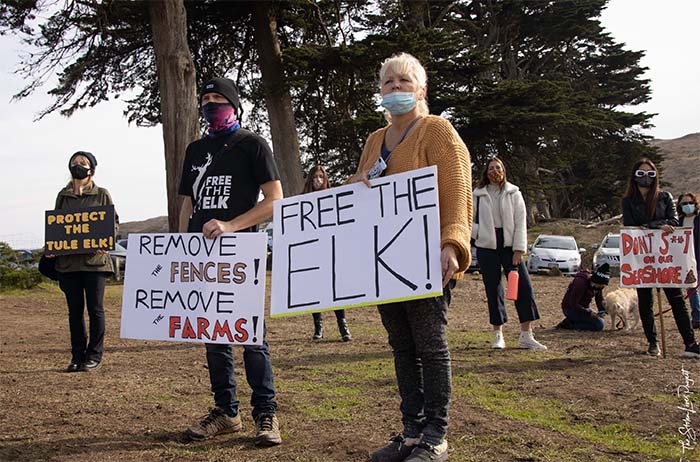
Point Reyes, Calif. (April 10, 2021) — In Defense of Animals, TreeSpirit Project and ForELK are hosting a rally on Saturday, April 10 to highlight the deadly mismanagement of Point Reyes National Seashore. The National Park Service (NPS) announced that 152 Tule elk died in 2020, one in three elk inside a “Preserve.” Activists raised the alarm about the huge number of elk dying during the drought, but the NPS repeatedly failed to acknowledge the problem or enact its emergency plan. When activists delivered water to the elk, the NPS immediately dumped it.
The Tule elk at this Preserve are precious since they are the largest remaining population of their species in the world. However, they are prevented from reaching water and forage in California’s drought season since they are trapped behind an 8-foot fence which stretches for miles across the peninsula. The fence preserves resources for private ranchers. Over 100 more of these rare native elk are expected to die this year if the NPS is allowed to enact its disastrous and controversial management plan. Fenced elk will continue to die from drought and elk in two other free-ranging herds will be shot to benefit private, profit-driven ranchers renting land at below-market rates in this public national park unit.
What: Rally to save Tule elk
Where: Bear Valley Visitor Center, Point Reyes Station
When: Saturday, April 10, 2021 from 11 a.m. to 2 p.m.
Who: Citizen supporters of Tule elk, wildlife, national parks; local environmental organizations
RSVP and More Information: https://www.facebook.com/events/1137146930062898
For months, advocates for Tule elk, who are a protected species endemic to California, have been sounding the alarm over life-threatening conditions inside the Tule Elk Preserve at Tomales Point, and opposing the pending management plan that will perpetuate and expand both ranching and policies lethal to elk and harmful to all wildlife in Point Reyes.
Serious concerns about the lack of access to adequate water and forage have been raised and documented for the fenced Tomales Point herd, but the NPS not only willfully failed to act, but even removed water provided by activists on two separate occasions in recent months.
The latest elk numbers announced by the NPS on March 30, 2021, reduces the elk population at Tomales Point from 445 to 293, and follows a similar mass killing by neglect between 2012 and 2015, when more than 250 elk died as a result of drought conditions and prevented from accessing water. Without intervention, many more are expected to die in the coming months of summer-autumn drought.
Despite being mandated by national park legislation to protect the Tule elk, the NPS has instead allowed elk to unnecessarily suffer and die, instead prioritizing resources for (5,600) privately-owned dairy and beef cows who outnumber (600) Tule elk nine-to-one.
The NPS is also proposing an updated General Management Plan that will allow ranchers operating in this national park unit, already benefiting from below-market leases, to diversify their operations, and extend their leases for 20 more years.
This would further jeopardize Tule elk and other species, and continue to damage this national park’s terrestrial and aquatic ecosystems. Independent water quality testing recently initiated by In Defense of Animals and Western Watersheds Project found extremely high levels of fecal coliform in water draining from ranches, with some showing E. coliand enterococci at levels that exceed the allowable human health limits by 40x and 300x, respectively.
“It’s unconscionable that these rare ‘wild’ elk have been fenced in and forced to suffer and die without adequate resources,” said Lisa Levinson, Wild Animals Campaign Director for In Defense of Animals. “They are confined to benefit publicly-subsidized beef and dairy ranches that currently dump millions gallons of excrement on the land every year, accelerating a climate crisis and destroying this unique and fragile ecosystem. The ranches need to go and the fence needs to come down.”
“There is nothing ‘natural,’ as the Park Service claims, about putting wild animals in an enclosure — in a national park, yet — and then claiming they’re still wild and should be left to die. Either take down the fences or provide the trapped elk food and water. A private zoo killing this many animals via starvation and thirst would be convicted of animal abuse,” said Jack Gescheidt of The TreeSpirit Project.
“We have tried on numerous occasions to work with the NPS on this issue. They continue to ignore us and the thousands of people who are catching wind of these malicious practices. We want accountability from NPS staff, and most importantly we want a thriving and free Tule elk population,” said Diana Oppenheim of ForELK.
The public is being encouraged to take action before the next California Coastal Commission meeting on April 22 at: www.idausa.org/elk
RSVP on Facebook: https://www.facebook.com/events/1137146930062898
Contacts:
In Defense of Animals, Lisa Levinson, lisa@idausa.org, 215-620-2130
ForELK, Diana Oppenheim, action@forelk.org, 248-840-5684
The TreeSpirit Project, Jack Gescheidt, jack@TreeSpiritProject.com, 415-488-4200
######
In Defense of Animals is an international animal protection organization based in Marin with over 250,000 supporters and a 37-year history of protecting animals’ rights, welfare, and habitats through education, campaigns, and hands-on rescue facilities in India, South Korea, and rural Mississippi. www.idausa.org/elk
The TreeSpirit Project combines art, advocacy and activism to raise awareness of the crucial role of trees, forests, wild animals, and the natural world in our human lives, both globally and personally. TreeSpiritProject.com/elk
ForELK is a grassroots organization of people who fight for the protection of the Tule elk and their habitat within Point Reyes National Seashore. They work toward public engagement through education, direct outreach, network building, political demonstrations and protests. www.forelk.org





